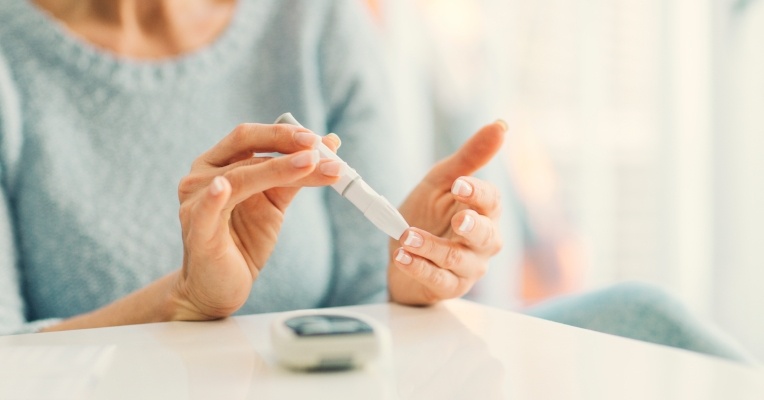According to Center for Disease Control and Prevention, 29.1 million people in the United States suffer from diabetes. More than likely you or someone you know has experience living with diabetes. We recently interviewed a type 2 diabetes patient to hear first-hand about how she started coping with the disease.

Read on to learn more about facts to better understand the disease, Cheryl’s personal diabetes story and what you can do to treat and cope with it.
What Are Type 2 Diabetes Symptoms and Complications?
Are you or someone you know a type 2 diabetes sufferer? Type 2 diabetes has the tell-tale signs that can help indicate presence of the disease.
Symptoms of type 2 diabetes include:
- Increased thirst and hunger
- Weight loss
- Fatigue
- Blurred vision
- Frequent infections
Life-threatening complications of type 2 diabetes can include heart disease, kidney damage, blindness, circulation loss and nerve damage.
Cheryl’s Story About Coping With Diabetes
Q: Tell us about your experience with being diagnosed with diabetes and how you reacted.
A: When I was first diagnosed as a diabetic, I’d venture to say it was about 12 years ago. I was in complete shock. I was overwhelmed, and that all turned into anger. I never thought at my age, which was my early 40s, that I would be diagnosed with diabetes.
Diabetes fact: Type 2 diabetes is the most common form of diabetes accounting for 90-95% of all diagnosed cases. (tweet this)
Q: How did your initial reactions to being diagnosed affect you?
A: As a matter of fact I was in denial, and the longer I thought about it the more I realized that it was something I had to take control of because it was eventually taking control of me.
Q: Was there a turning point for you? How did you start to cope and come to peace with it?
A: It was getting bigger than I was, and basically I realized I really need to concern myself about the rest of my life. If I wanted to see my grandchildren and enjoy my life once I’m retired I really needed to take control and not let it get the best of me and not let it consume me as it was doing.
Did you know? The more in control and proactive you are with your diabetes, the higher chance you will prevent complications from increasing. (tweet this)
Q: Were there any resources or things that helped you cope?
A: Technology, the way it is today, they have come up with more and more ways to make it easier for people and it’s not as hard as it was for my older relatives, so with that I found that it doesn’t have to be my whole life, but just a part of my life.
An Endocrinologist’s Point of View on Coping with Diabetes
Our resident endocrinologist, CEO and Medical Director of Chase Medical Research, Dr. Joseph Soufer, weighed in on how a type 2 diabetes patient can cope with diabetes.
He advised that one of the best things diabetics can do is to find resources in addition to their primary doctors that can support the diabetic.
“You should always ask your primary care doctor for other sources, i.e. who to speak with... people that may be able to help you with your disease process such as a dietitian, diabetic educator, and when you need to be followed up with for example for foot care a podiatrist and for your eye care an opthamologist,” Dr. Soufer said.
Dr. Soufer goes on to say that these specialists can be very knowledgeable about different aspects of diabetes that a primary care doctor might not have the time to speak about thoroughly with a diabetic [during visits].
“When we think about it, we’re with our primary care doctor maybe three or four times a year and able to see them for 15-20 mins and that’s excluding talking to them about other diseases. That’s why it’s important to reach out to these other support systems,” like the “American Diabetes Association and reaching out to them to be able to inform yourself about the newer aspects of diabetes,” Dr. Soufer said.
What Else Can a Type 2 Diabetic Do to Cope with Diabetes?
In addition to visiting your primary care doctor and seeking other specialized resources to cope, some diabetics consider participating in clinical trials. In fact, clinical trial participation may help improve your blood sugar to help prevent future diabetic complications.
Dr. Soufer also recommends research because it provides diabetics with a chance to “learn more about the newer aspects of diabetes care as well as solutions or new medications that are coming out.”
Share This Post
Recent Posts
- The Relationship Between Obesity and Obstructive Sleep Apnea March 6 2017
- Cardiovascular Outcome Clinical Trials March 6 2017
- Diabetic Peripheral Neuropathic Pain March 6 2017
- Are All Types of Cholesterol Bad? March 6 2017
- Blood Pressure: The Highs, the Lows, and Everything in Between March 6 2017
Categories
- Clinical Trials
- Cardiovascular Disease
- Diabetes
- Obesity
- Kidney Disease
- Hypertension
- Pain Management
- Vaccine
- Cholesterol
- Chronic Obstructive Pulmonary Disease
- Diabetic Peripheral Neuropathy
- Migraine
- Osteoarthritis
- Biologics
- COVID-19
- Gastroesophageal Reflux Disease
- Irritable Bowel Syndrome with Constipation
- Lyme Disease
- Nonalcoholic Steatohepatitis
- Respiratory Syncytial Virus



